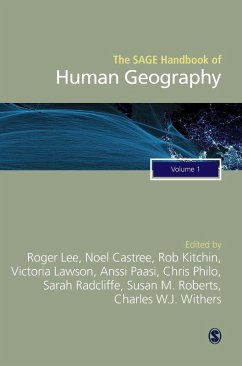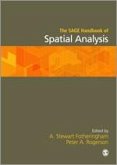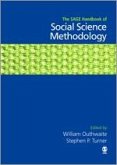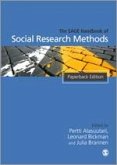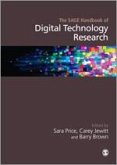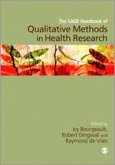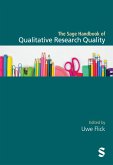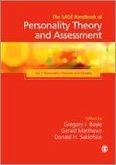The SAGE Handbook of Human Geography
Herausgeber: Lee, Roger; Kitchin, Rob; Castree, Noel
The SAGE Handbook of Human Geography
Herausgeber: Lee, Roger; Kitchin, Rob; Castree, Noel
- Gebundenes Buch
- Merkliste
- Auf die Merkliste
- Bewerten Bewerten
- Teilen
- Produkt teilen
- Produkterinnerung
- Produkterinnerung
Published in association with the journal, Progress in Human Geography, and edited and written by the biggest names in the field, the Handbook sets out what it is that human geography does in coming to know, assess and live the world.
Andere Kunden interessierten sich auch für
![The SAGE Handbook of Spatial Analysis The SAGE Handbook of Spatial Analysis]() A . Stewart Fotheringham / Peter A Rogerson (eds.)The SAGE Handbook of Spatial Analysis166,99 €
A . Stewart Fotheringham / Peter A Rogerson (eds.)The SAGE Handbook of Spatial Analysis166,99 €![The SAGE Handbook of Social Science Methodology The SAGE Handbook of Social Science Methodology]() William Outhwaite / Stephen P Turner (eds.)The SAGE Handbook of Social Science Methodology171,99 €
William Outhwaite / Stephen P Turner (eds.)The SAGE Handbook of Social Science Methodology171,99 €![The SAGE Handbook of Social Research Methods The SAGE Handbook of Social Research Methods]() The SAGE Handbook of Social Research Methods171,99 €
The SAGE Handbook of Social Research Methods171,99 €![The SAGE Handbook of Digital Technology Research The SAGE Handbook of Digital Technology Research]() The SAGE Handbook of Digital Technology Research171,99 €
The SAGE Handbook of Digital Technology Research171,99 €![The SAGE Handbook of Qualitative Methods in Health Research (First Edition) The SAGE Handbook of Qualitative Methods in Health Research (First Edition)]() The SAGE Handbook of Qualitative Methods in Health Research (First Edition)171,99 €
The SAGE Handbook of Qualitative Methods in Health Research (First Edition)171,99 €![The Sage Handbook of Qualitative Research Quality The Sage Handbook of Qualitative Research Quality]() The Sage Handbook of Qualitative Research Quality163,99 €
The Sage Handbook of Qualitative Research Quality163,99 €![The SAGE Handbook of Personality Theory and Assessment The SAGE Handbook of Personality Theory and Assessment]() The SAGE Handbook of Personality Theory and Assessment173,99 €
The SAGE Handbook of Personality Theory and Assessment173,99 €-
-
-
Published in association with the journal, Progress in Human Geography, and edited and written by the biggest names in the field, the Handbook sets out what it is that human geography does in coming to know, assess and live the world.
Produktdetails
- Produktdetails
- Verlag: SAGE Publications Ltd
- Seitenzahl: 842
- Erscheinungstermin: 5. Juni 2014
- Englisch
- Abmessung: 250mm x 175mm x 49mm
- Gewicht: 1603g
- ISBN-13: 9780857022486
- ISBN-10: 0857022482
- Artikelnr.: 38577061
- Herstellerkennzeichnung
- Libri GmbH
- Europaallee 1
- 36244 Bad Hersfeld
- gpsr@libri.de
- Verlag: SAGE Publications Ltd
- Seitenzahl: 842
- Erscheinungstermin: 5. Juni 2014
- Englisch
- Abmessung: 250mm x 175mm x 49mm
- Gewicht: 1603g
- ISBN-13: 9780857022486
- ISBN-10: 0857022482
- Artikelnr.: 38577061
- Herstellerkennzeichnung
- Libri GmbH
- Europaallee 1
- 36244 Bad Hersfeld
- gpsr@libri.de
Roger Lee is Emeritus Professor of Geography at Queen Mary, University of London. He is an economic geographer interested in the connections and contradictions between the presumed hard logics of economy and their socio-cultural practice and in the possibilities for progressive change that might ensue from the latter. Noel Castree is a Professor of Society & Environment at the University of Technology Sydney (UTS). He has applied Marxist political economy to understand global environmental change and policy. His recent research explores how different forms of expertise jostle to gain traction in public understandings of the Earth and its future trajectories. He is the managing editor of the peer review journal Progress in Human Geography, co-editor of the book David Harvey: A Critical Reader (2007) and author of Making Sense of Nature (2014). His recent articles have appeared in Anthropocene Review , Environmental Humanities and Ambio, among others. Rob Kitchin is a Professor in Maynooth University Social Sciences Institute and Department of Geography. He was a European Research Council Advanced Investigator on the Programmable City project (2013-2018) and a principal investigator on the Building City Dashboards project (2016-2020) and for the Digital Repository of Ireland (2009-2017). He is the (co)author or (co)editor of 31 other academic books, and (co)author of over 200 articles and book chapters. He has been an editor of Dialogues in Human Geography, Progress in Human Geography and Social and Cultural Geography, and was the co-Editor-in-Chief of the International Encyclopedia of Human Geography. He was the 2013 recipient of the Royal Irish Academy's Gold Medal for the Social Sciences. Victoria Lawson is Professor of Geography and former chair at the University of Washington Geography Department. Her work engages with feminist care ethics, relational poverty studies and comparative qualitative methodologies. She served as North American Editor for PiHG (2008-2012) and is editorial board member of Economic Geography. Anssi Paasi is Professor of Geography at the University of Oulu, Finland. He has published widely on the socio-cultural construction of political borders, spatial identities, new regional geography, and on region/territory building processes. His books include Territories, Boundaries and Consciousness (Wiley 1996) Chris Philo is a professor of geography at the University of Glasgow. His specialist interest is the historical geography of "spaces reserved for insanity," meaning people with mental health problems, across many centuries in Britain. He is fascinated by the history and theory of geography, as both academic subject and wider way of engaging with the world. He has undertaken critical-scholarly research on the geographies of "outsider" human groupings, including children and people with learning disabilities, as well as on the geographies of human-animal relations, rural geographies, and a range of health geographies. He has long been concerned with what psychoanalytic and psychological approaches can bring to geographical studies. Sarah A Radcliffe is Professor of Latin American Geography, at the University of Cambridge. She has interests in development geography, gender and geography, and postcolonial approaches. She has published widely on these themes in English and Spanish, including Indigenous Development in the Andes: Culture, Power and Transnationalism (2009, Duke University Press, co-author). Professor Radcliffe′s latest book is Dilemmas of Difference: Indigenous women and the limits of postcolonial development policy (2015, Duke University Press). Susan M. Roberts is Professor of Geography and member of the Committee on Social Theory at the University of Kentucky. Her interests include political and economic geography, and the political economy of inequality and development. Professor Charles W J Withers is Ogilvie Chair of Geography and Professor of Historical Geography at the University of Edinburgh. He has been a professor in Edinburgh since 1994. He is a fellow of the British Academy, of the Royal Society of Edinburgh, the Royal Scottish Geographical Society, and the Royal Historical Society. In 2008, he was awarded the Centenary Medal of the Royal Scottish Geographical Society in recognition of his 'outstanding and sustained contribution to historical geography, the history of cartography and to the history of geographical knowledge'. In 2012, he was awarded the Founders' Gold Medal of the Royal Geographical Society. This, one of the Society′s two Royal Gold Medals, was given in respect of his 'world-leading encouragement and development of historical and cultural geography'. Professor Withers′ research and teaching interests centre on the historical geography of science and the Enlightenment, the historical geographies of print and exploration, and the history of cartography. He is the author or co-author of ten research monographs, and a further nine co-edited volumes, in addition to numerous scholarly articles and essays. His co-authored Scotland: Mapping the Nation (written with Chris Fleet and Margaret Wilkes), which was published in 2011 by Birlinn Press in association with the National Library of Scotland, was the Scottish Research Book of the Year in the Saltire Society Literary Awards for 2012. His most recent book, co-authored with Innes Keighren and Bill Bell, is Travels into Print: Exploration, Writing, and Publishing with John Murray, 1773-1859′. This was published by the University of Chicago Press in May 2015. In 2015, he was appointed by Her Majesty Queen Elizabeth II and First Minister Nicola Sturgeon to the position of Geographer Royal for Scotland, the first person to hold this title as a personal honorific for 118 years. He is currently writing a historical geography of the Prime Meridian, a narrative for which we know the solution ('Greenwich, from 1884') but not the problem.
VOLUME ONE
Part I: Imagining Human Geographies
Place - Tim Cresswell
Mobilities - Johanna Waters
Spatialities - Jacques Lévy
Difference - Katharyne Mitchell
More-than-Human Geographies - Beth Greenough
Society-Nature - Andrea Nightingale
Transformations - Dan Clayton
Critique - Alastair Bonnett
Geo-historiographies - Trevor Barnes
Part II: Practising Human Geographies
Capturing (GIS) - Matt Wilson and Sarah Elwood
Noticing - Eric Laurier
Representing - Anna Barford
Writing (somewhere) - Juliet Fall
Researching - Meghan Cope
Producing - Mia Gray
Engaging - Jane Wills
Educating - Avril Maddrell and Jenny Hill
Advocacy - Audrey Kobayashi
VOLUME TWO
Part III: Living Human Geographies
Ethics - Elizabeth Olson
Economy - Marianna Pavlovskaya and Kevin St Martin
Society - Jamie Winders
Culture - Patricia Price
Politics - David Featherstone
Words - Christopher Philo and Cheryl McGeachan
Power - Louise Amoore
Development - Kate Wills
Bodies - Rachel Silvey and Jean-Francois Bissonnette
Identities - Robyn Dowling and Katherine McKinnon
Demographies - Elspeth Graham
Health - Matt Sparke
Resistance - Sarah Wright
Part IV: Appendix- Transcriptions
Online Video Conversations
Why Human Geography?: an editorial conversation - Roger Lee, Noel Castree,
Sarah Elwood, Rob Kitchin and Susan Roberts
Geography and geographical thought - David Livingstone and Doreen Massey
Nature and Society - Susan Owens and Sarah Whatmore
Geography and geographical practice - Katherine Gibson and Susan J Smith
Part I: Imagining Human Geographies
Place - Tim Cresswell
Mobilities - Johanna Waters
Spatialities - Jacques Lévy
Difference - Katharyne Mitchell
More-than-Human Geographies - Beth Greenough
Society-Nature - Andrea Nightingale
Transformations - Dan Clayton
Critique - Alastair Bonnett
Geo-historiographies - Trevor Barnes
Part II: Practising Human Geographies
Capturing (GIS) - Matt Wilson and Sarah Elwood
Noticing - Eric Laurier
Representing - Anna Barford
Writing (somewhere) - Juliet Fall
Researching - Meghan Cope
Producing - Mia Gray
Engaging - Jane Wills
Educating - Avril Maddrell and Jenny Hill
Advocacy - Audrey Kobayashi
VOLUME TWO
Part III: Living Human Geographies
Ethics - Elizabeth Olson
Economy - Marianna Pavlovskaya and Kevin St Martin
Society - Jamie Winders
Culture - Patricia Price
Politics - David Featherstone
Words - Christopher Philo and Cheryl McGeachan
Power - Louise Amoore
Development - Kate Wills
Bodies - Rachel Silvey and Jean-Francois Bissonnette
Identities - Robyn Dowling and Katherine McKinnon
Demographies - Elspeth Graham
Health - Matt Sparke
Resistance - Sarah Wright
Part IV: Appendix- Transcriptions
Online Video Conversations
Why Human Geography?: an editorial conversation - Roger Lee, Noel Castree,
Sarah Elwood, Rob Kitchin and Susan Roberts
Geography and geographical thought - David Livingstone and Doreen Massey
Nature and Society - Susan Owens and Sarah Whatmore
Geography and geographical practice - Katherine Gibson and Susan J Smith
VOLUME ONE
Part I: Imagining Human Geographies
Place - Tim Cresswell
Mobilities - Johanna Waters
Spatialities - Jacques Lévy
Difference - Katharyne Mitchell
More-than-Human Geographies - Beth Greenough
Society-Nature - Andrea Nightingale
Transformations - Dan Clayton
Critique - Alastair Bonnett
Geo-historiographies - Trevor Barnes
Part II: Practising Human Geographies
Capturing (GIS) - Matt Wilson and Sarah Elwood
Noticing - Eric Laurier
Representing - Anna Barford
Writing (somewhere) - Juliet Fall
Researching - Meghan Cope
Producing - Mia Gray
Engaging - Jane Wills
Educating - Avril Maddrell and Jenny Hill
Advocacy - Audrey Kobayashi
VOLUME TWO
Part III: Living Human Geographies
Ethics - Elizabeth Olson
Economy - Marianna Pavlovskaya and Kevin St Martin
Society - Jamie Winders
Culture - Patricia Price
Politics - David Featherstone
Words - Christopher Philo and Cheryl McGeachan
Power - Louise Amoore
Development - Kate Wills
Bodies - Rachel Silvey and Jean-Francois Bissonnette
Identities - Robyn Dowling and Katherine McKinnon
Demographies - Elspeth Graham
Health - Matt Sparke
Resistance - Sarah Wright
Part IV: Appendix- Transcriptions
Online Video Conversations
Why Human Geography?: an editorial conversation - Roger Lee, Noel Castree,
Sarah Elwood, Rob Kitchin and Susan Roberts
Geography and geographical thought - David Livingstone and Doreen Massey
Nature and Society - Susan Owens and Sarah Whatmore
Geography and geographical practice - Katherine Gibson and Susan J Smith
Part I: Imagining Human Geographies
Place - Tim Cresswell
Mobilities - Johanna Waters
Spatialities - Jacques Lévy
Difference - Katharyne Mitchell
More-than-Human Geographies - Beth Greenough
Society-Nature - Andrea Nightingale
Transformations - Dan Clayton
Critique - Alastair Bonnett
Geo-historiographies - Trevor Barnes
Part II: Practising Human Geographies
Capturing (GIS) - Matt Wilson and Sarah Elwood
Noticing - Eric Laurier
Representing - Anna Barford
Writing (somewhere) - Juliet Fall
Researching - Meghan Cope
Producing - Mia Gray
Engaging - Jane Wills
Educating - Avril Maddrell and Jenny Hill
Advocacy - Audrey Kobayashi
VOLUME TWO
Part III: Living Human Geographies
Ethics - Elizabeth Olson
Economy - Marianna Pavlovskaya and Kevin St Martin
Society - Jamie Winders
Culture - Patricia Price
Politics - David Featherstone
Words - Christopher Philo and Cheryl McGeachan
Power - Louise Amoore
Development - Kate Wills
Bodies - Rachel Silvey and Jean-Francois Bissonnette
Identities - Robyn Dowling and Katherine McKinnon
Demographies - Elspeth Graham
Health - Matt Sparke
Resistance - Sarah Wright
Part IV: Appendix- Transcriptions
Online Video Conversations
Why Human Geography?: an editorial conversation - Roger Lee, Noel Castree,
Sarah Elwood, Rob Kitchin and Susan Roberts
Geography and geographical thought - David Livingstone and Doreen Massey
Nature and Society - Susan Owens and Sarah Whatmore
Geography and geographical practice - Katherine Gibson and Susan J Smith

